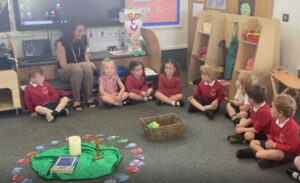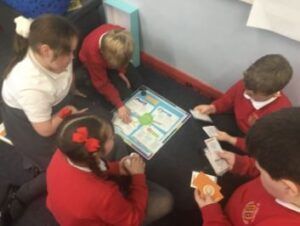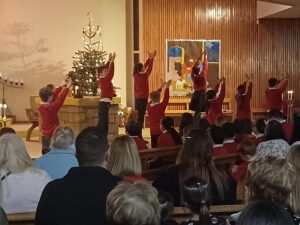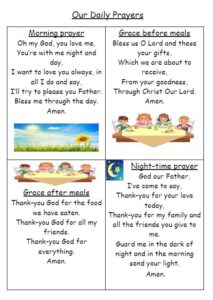Collective Worship
AIM & PURPOSE OF COLLECTIVE WORSHIP
At St Joseph’s, Jesus Christ remains central to every aspect of school life. We aim to be a living, loving and sacramental community which is in inspired by the life of Christ and the teachings of the Church, rooted in Gospel values. We hope that from the minute you enter our school you clearly see and feel that we are a Catholic community.
Acts of worship may take place at any time during the day. It may take the form of a single act of worship with the whole school community or separate acts of worship in school/class groups. In our school there is no confusion between Collective Worship and Assemblies. When we gather for Worship we focus on the Word of God, we use symbol and ritual and we are open to God’s presence among us. Collective Worship is not designated curriculum time under regulations and will not be subsumed under any part of the curriculum including RE.
Collective Worship in our school is an integral part of our ethos, aims and relationships, as Christian values permeate all aspects of school life and all relationships. It is a way of deepening our relationship with God together and individually. Through the many forms this worship takes we grow in spiritual, moral and liturgical understanding. We allow ourselves to grow in understanding of our living faith tradition and then develop a sense of wonder and inspiration in the person of Christ. It is through Collective Worship that we share each other’s faith experiences and learn the skills of prayer and reflection. This is a very important aspect of life at St Joseph’s.
We aim to:
- develop an awareness and understanding of the presence of God in each individual child’s life and to encourage a personal response to that presence
- allow each child to develop their conscience and make sound moral judgements based on commitment to following Christ
- offer opportunities to deepen their faith and foster attitudes of care and respect for each other
- live, experience and understand the Liturgical life of the Church through the Liturgical Year together with Feast days
- promote sacramental life of Christian families and to encourage parents to take an active part in the preparation of their children for the sacraments of Reconciliation, Holy Communion and Confirmation
- foster school-parish links to ensure that our children remain exposed and committed to the Catholic faith experiencing liturgy and worship beyond and realms of the school curriculum
- enable each child to participate and respond to liturgy and worship in an appropriate way to their age and maturity

COLLECTIVE WORSHIP IN OUR SCHOOL
The RE Coordinator and Head Teacher ensure a cohesive response to the development of child and staff spirituality.
Collective worship takes place in school daily, staff and pupils are encouraged to pray with thoughtfulness and with respect through a variety of prayer experiences – whole school Masses and ‘Celebration of the Word’, assemblies and prayer services together with formal classroom and individual reflective prayer. This worship will follow the liturgical year and include appropriate feast days, it will also encompass Gospel Virtues, British values, world events and worlds faiths to enable pupils to appreciate their place in society and respect those around them. Nursery experiences classroom prayer and assemblies and, when ready, whole School Mass.
COLLECTIVE WORSHIP PREPARATION
Our pupils prepare their own class worship using the Let Us Pray 2gether resources. This takes the form of 5 parts:
Preparation – When, where, who, what? What resources will I need? Create focus.
Gathering – How will we begin / enter – to music?
Listening – Reading from scriptures. Pause at times for quiet contemplation.
Responding – What do participants do? Quiet reflection, formal / informal prayer / respond to bidding prayers.
Go Forth – What will I do to help those present take the message away with them?

UNDERSTANDING OF THE LITURGICAL CALENDAR
We ensure that pupils are aware of the Liturgical Calendar and key events in the Church. The symbolism of colours is made clear from the earliest days in our school: purple for penance (seen during advent and Lent), red for Holy Spirit and martyrdom (seen at Pentecost), white, gold for important feasts, green for the ordinary times of the year, blue is associated with Mary.
Some months of the year have special foci. October is the month of the Rosary, November is the month when the Holy Souls (the deceased) are prayed for, May is the month when Mary is especially remembered and June is the month of the Sacred Heart when we remember especially the great love Jesus has for us. We also celebrate the feast of St Joseph the Worker in May.
MASSES
The whole school celebrates Mass together with our parents and parish community on a regular basis, and this is dependent on the liturgical calendar. We also hold special Masses at the beginning and end of the school year. Children play an active part in each Mass, through reading, praying, singing, altar serving and taking part in entrance and offertory processions.

Pupils and their families are also invited to participate in Sacramental Masses at the parish which supports their journey of faith as members of our wider Church Community.
The parish Wednesday Mass is attended by a different class each week, strengthening the relationship between our pupils and the parishioners.
CELEBRATION OF THE WORD
There are two weekly whole-school ‘Celebration of the Word.’ services, led by different members of staff. On Mondays, our ‘Celebration of the Word’ focuses upon the liturgical year with the relevant word and is supported by the help our RE Ambassadors. The second ‘Celebration of the Word’, known as ‘Wednesday Word’, is led by teaching staff, with a clear focus. This may be a specific piece of scripture, a story, a celebration or a time for meditation. The focus for the ‘Wednesday Word’ is also used for the whole class ‘Celebration of th Word’ on Thursday’s, which is planned and led by pupils.
We also have a Celebration assembly each Friday which showcases the achievements and success of our children’s God-given talents and is supported by the help of our Head Boy and Girl.
Each class lead a liturgical assembly once a year to which parents are invited.
FORMAL AND TRADITIONAL PRAYER
 Children are encouraged to develop their individual prayer life through daily participation in our formal prayers such as our school prayer, morning prayer, grace before and after meals and evening prayer. It is important that we enable pupils to participate in community of the Church through learning our traditional Church prayers. Formal prayers, appropriate to the age and maturity of the year group are taught through the RE Strategy, each class teacher a copy of the prayers that their class are expected to learn in each year.
Children are encouraged to develop their individual prayer life through daily participation in our formal prayers such as our school prayer, morning prayer, grace before and after meals and evening prayer. It is important that we enable pupils to participate in community of the Church through learning our traditional Church prayers. Formal prayers, appropriate to the age and maturity of the year group are taught through the RE Strategy, each class teacher a copy of the prayers that their class are expected to learn in each year.

